The Rovuma liquefied natural gas (LNG) project will serve as a key for the development of a series of substantial gas fields within the Rovuma Basin, offshore Mozambique.
The project is owned by Mozambique Rovuma Venture (MRV), a joint venture between Eni, ExxonMobil, and China National Petroleum Corporation (CNPC), which collectively holds a 70% stake. The remaining interest is evenly divided among Galp, KOGAS and Empresa Nacional de Hidrocarbonetos, with each holding a 10% share.
The Rovuma LNG project will supply Mozambique with up to 17,000tpa of liquefied petroleum gas (LPG), thereby enhancing energy accessibility for the local populace.
The project is anticipated to have an LNG production capacity of 15 million tonnes per annum (mtpa) and 2.4 billion cubic metres (bcm) in gas resources.
The phase one development plan for the Rovuma LNG project was submitted to the Mozambican Government in May 2019. Production is targeted to commence in 2025.
Location of the Rovuma LNG project
The Rovuma LNG project will be situated adjacent to the Mozambique project in Area 1, within a 6,475km-wide 50-year DUAT (land use right area) at Palma on the Afungi peninsula.
The project will also involve Area 4, an exploration and production concession, in the Rovuma Basin in Northern Mozambique.
The Area 4 concession is located offshore the Cabo Delgado province in northern Mozambique.
Rovuma LNG project details
The first phase of the Mozambique LNG project will focus on the development of three fields within the Mamba complex in Area 4 of the Rovuma Basin. The deepwater Area 4 block holds more than 85 trillion cubic feet (tcf) of natural gas.
The project will involve the construction of two onshore liquefaction trains, each with a capacity of 7.6mtpa, along with associated onshore facilities. It will be supported by two 200,000m³ LNG storage tanks and two 45,000m³ condensate tanks.
The Area 4 concession, which will be operated by Mozambique Rovuma Venture, extends 50km offshore and is set to commence with the extraction of up to 12tcf of dry natural gas, with an ultimate goal of producing approximately 50mtpa of LNG.
The upstream segment of the project will consist of 24 wells, a subsea intra-field gathering system, an export sea line system, and a subsea network control system from onshore connected via umbilical.
LNG liquefaction train details
The LNG liquefaction trains will be equipped with an H-100 series gas turbine and a 120MW capacity compressor.
Developed by Mitsubishi Hitachi Power Systems (MHPS), the H-100 is the world’s largest dual-shaft heavy-duty gas turbine, renowned for its high efficiency, reliability, and low maintenance requirements.
The H-100 is ideally suited as a main refrigeration compressor driver for large-scale LNG plants with any liquefaction process. The robust and simple design does not require any external helper motor or intercooler and maximises space efficiency.
An additional benefit of H-100 is operational flexibility, including broad variable-speed operation, reduced start-up times, and the capability for full-pressure restarting of refrigeration compressors without the necessity of flaring refrigerant.
Contractors involved
A consortium of TechnipFMC, JGC, and Fluor was awarded the engineering, procurement and construction (EPC) contract in October 2019 for the onshore LNG production complex.
TechnipFMC is a global leader in subsea, onshore/offshore, and surface projects and JGC is a Japanese engineering-focused EPC company while Fluor is an American multinational engineering and construction company.
Mitsubishi Heavy Industries (MHI), a leading industrial group in the energy, logistics and infrastructure sectors, reached an agreement with ExxonMobil and its co-venture partners in April 2019, to supply H-100 gas turbine and compressor packages for phase one of the project.
Mitsubishi Heavy Industries Compressor Corporation (MCO) will provide the main liquefaction compressors while Mitsubishi Hitachi Power Systems (MHPS) will supply the dual-shaft gas turbines for the plant.
Airswift, a workforce solutions provider, was contracted to supply both national and expatriate consultants for the construction phase.
Bonatti International, a construction-focused engineering company, is tasked with providing accommodation and workstation facilities for the workforce for the Rovuma LNG project.






